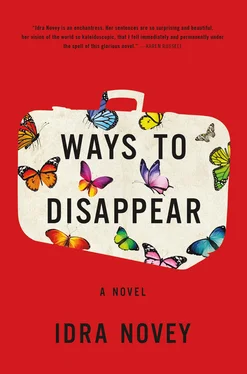Raquel, dear, Rocha was saying, if I give you the ransom money, these hyenas will know you’ve found a source of significant cash. They’ll just keep feasting on you for more.
But we’ll pay you back eventually. All I’m asking for is a loan. They have my brother, for God’s sake. Puta que o pariu! Raquel swore, and let out such a primal, sorrowful sound that Emma saw something give in Rocha’s face, and she thought, Now.
What if instead of a loan, she spoke up, it was a trade? If in exchange for the ransom we could offer you, Roberto, a new manuscript by Beatriz?
At the word “manuscript,” both Raquel and Rocha sat up in their chairs as if a tremor had passed through the room.
I thought she was getting nowhere with the new book, he said.
She has over two hundred pages.
But they’re private still, Raquel said. They’re just a jumble of scenes. She shot a violent glare at Emma, but Rocha had already turned his rotund body as much as the armchair would allow.
And the manuscript is here, in Salvador? he asked.
It’s here in this room, Emma said. If you write the check, you can have it now.
No, he can’t, Raquel said, but Emma ignored her. Rocha’s face had taken on a hot glow, his eyes flaming in his round face like a pair of candles inside a carved pumpkin.
Obviously, something has to be done for poor Marcus, Rocha said, but seventy-five thousand dollars—
We can take it to Alfaguara or another publisher if you’re not interested, Emma said. Raquel let out a huff in the other armchair, but she was the present but unacknowledged one now.
How about fifty? Rocha wagered.
Eighty, Emma said. With all the media attention, the book will sell out immediately.
Rocha sat back in his chair and Emma felt the chips sliding in her direction. She willed her face to stay impassive, willed her thoughts not to return to Marcus happening upon her thigh in the taxi, of him straddling her in bed.
You must be familiar with her vignette “The Old Man and His Book,” Rocha said.
I translated it in one night, Emma said. It was a short piece, no more than a few hundred words. An old man got into bed with the only book he’d ever owned and found that a blue fungus had begun to bloom over the words. The man tried to pick off the fungus with his fingernails. He knew the sentences by heart, but he still opened the book for the pleasure of the letters, of seeing them form the words he already knew. Yet the more fungus he scraped off, the bluer his hands became. By the time someone from the village found the old man deceased in his bed, they couldn’t tell where the fungus on the pages ended and the old man’s blued hands began.
I thought Para R. was for Raquel, Emma said, but the story is for you. For your hands.
Rocha reached for the briefcase beside the claw-footed leg of his chair, and Emma realized she was holding her breath.

Oh, yes, he was still breathing. He was still alive. No one was going to seal the coffin on Roberto Rocha and Editora Eco just yet. On the plane, he made so many notes and edits on Beatriz’s manuscript that both of his pens ran out of ink and he had to ask the stewardess for another and work with the poorest quality writing utensil imaginable.
The first drafts he’d seen from Beatriz thirty years ago had been just like this, with each burst of brilliance buried in pages and pages of excess and repetitions. The translator had been shrewd to bargain the way she had, but Rocha didn’t feel swindled. He’d worked with Beatriz on enough stories to know that something sublime was buried here. It was just a question of streamlining. By the time his plane began its descent toward Galeão International Airport, he’d figured it out: the story was in the changes. All he had to do was winnow out everything but the details that altered in each telling. The beauty of the story was the futility of it, the devastating failure of the author’s attempts to recast a rape and its aftermath by simply changing the fabric of a dress or the entrée on the table.
With Beatriz missing, the critics were going to speculate until they got light-headed about whether the scene at Cine Paissandu was autobiographical. Alessandro was going to be horrified at how much he’d paid for the manuscript, but what was money for if not to halt the mutilation of some boy’s face and his possible death? What was the point of being an editor if he didn’t have a manuscript like this one in front of him, if his days contained nothing but enervating sentences that risked nothing, asked nothing, did nothing but require ink in a book that generated no real emotion, no genuine unease, not even from the editor who published it?
Rocha shook out the last greasy cashew from his in-flight snack mix and crumpled up the bag like so much fiction. With his other hand, he set the milk in his coffee awhirl.

The world, according to Beatriz, made no exceptions for lovers. A flood was just as likely to carry away two devoted lovers in a bed as it was a house filled with cobwebs. A dengue-infected mosquito was just as likely to bite the back of a man kissing his wife as the knee of a politician while he hid the city’s coffers in his armoire.
And the world had made no exception for Marcus. Emma had slept with him, read his mother’s work to him while he lay so close to her she could hear his heart. None of it had kept him safe. They’d wired Rocha’s money to Flamenguinho immediately, but when she returned to her hotel at four, there was a shoe box inside a plastic bag waiting for her at the reception desk. It was an orange shoe box with the Nike logo on top. Inside, someone had placed a note and a sandwich-size plastic bag. Within the bag was a blood-crusted ear she had licked so recently she could still half taste it on her tongue.
The world made no exception for lovers. She had performed the sentence in English, had read it with a great sense of importance on a panel on Luso-Brazilian literature in Minneapolis and at a reading at the Barnes & Noble in Squirrel Hill. To get the sentence just right, she’d murmured it over and over, determined to re-create the spare beauty of its music, its somber tone.
Yet recalling the passage now, she felt numb to its beauty. All that registered was its desolation. She felt it with everything in her that could ache and break down. Because the world did not stop for lovers, Beatriz had written, lovers had no obligation to stop for the world or for the rain, for the beginning of a war or for its end. And there was nothing to be done about the lovers in the room next to Emma’s now, the sound of their headboard banging against the wall while she sat here, trembling.
Even mutilated, the shriveled-up flesh of Marcus’s ear looked particular, clearly belonging to a singular human form, just as the handwritten note was inexorably human in the inconsistent curves of its letters and the lunacy of its lines:
YOUR LOVER BOY CRIES LIKE
A GIRL.
YOU’RE GOOD FOR
FORTY MORE, TRANSLATOR.
SEND IT BY MIDNIGHT
OR I’LL SEND YOU A CHUNK
OF THE OTHER EAR.
SEND THE MONEY NOW
AND YOU GET YOUR
LOVER BOY
TOMORROW.
Emma translated the note several times, as if there were a chance that if she went over it again she might be able to come up with a less horrifying version, or could modify it so that it would suggest something slightly different, that Marcus was not tied up somewhere crying in pain or already unconscious by now. They must have put something on his head to bandage the wound. If they let him bleed to death or get an infection, there would be no money. She was fairly sure that was how kidnappings worked.
Читать дальше













